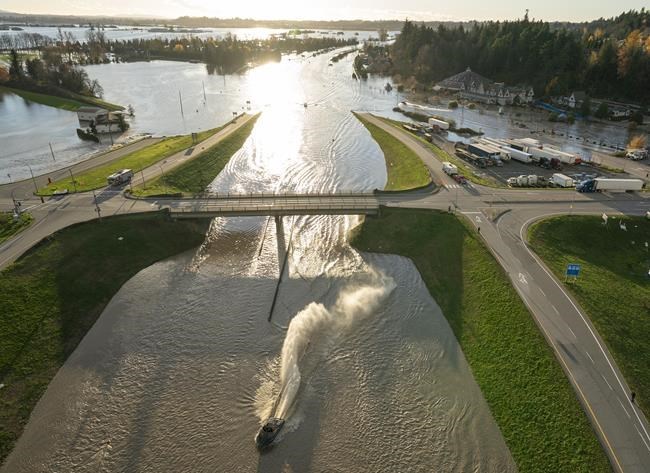VANCOUVER — Highway and railway closures caused by severe storms in British Columbia will have a significant and lasting impact on the province's economy, the president of the B.C. Chamber of Commerce says.
Fiona Famulak said industries across the supply chain will be affected and is calling on all levels of government to act with urgency to allocate the resources needed to replace the lost infrastructure.
"We need to move from response to recovery very quickly," she said. "We cannot be complacent. We need our trade corridors to be reopened and the movement of people, goods and services to be re-established as soon as possible."
All major highways between B.C.'s Lower Mainland and the Interior were severed, some in several locations, when record rainfall washed away bridges and roads over a 24-hour period starting Sunday.
At a news conference Wednesday, Premier John Horgan declared a provincewide state of emergency. He said his government is working to assess the damage and reopen supply roads as quickly and safely as possible.
“Already-strained supply lines are at risk of greater disruption,” said Horgan, adding the state of emergency should help preserve basic access to services and supplies.
“Please do not hoard items. We are confident that we can restore our supply chains in a quick and orderly manner, provided we all act as we have been over the past two years, responding to challenges like this in a collaborative, co-operative way.”
Public Safety Minister Mike Farnworth said the declaration could include emergency powers for dealing with hoarding and price gouging of goods.
“Our transportation infrastructure is crippled,” Farnworth said, while discouraging travel and urging calm. “Getting our roadways and railways back up and in operation is our No. 1 priority. We fully recognize how important it is to reopen road connections from the Lower Mainland to the Interior to get those supply chains moving.”
Following reports of food shortages and hoarding at grocery stores, Canadian food retailer Save-On-Foods said in a statement Tuesday that all shipments in and out of the Lower Mainland have been put on hold due to road conditions.
"We are exploring all avenues to get product to our stores as quickly as possible," it said.
Farnworth said the retail council and the trucking industry have been really clear that there’s lots of supply.
"Yes, we have routes that are challenged, but there are large areas of the province where those routes are not compromised and supplies are going to get through, and in those isolated communities, if supplies need to be brought in, we can do that.”
B.C. Trucking Association president Dave Earle said hundreds of truck drivers were unable to finish their routes due to the highway closures, but none reported being injured as a result of the flooding or landslides.
"Monday was all about protection of life and now we are focused on assessment, and clearly there's serious infrastructure damage on at least two of our four main routes," he said. "We have hundreds of commercial vehicles stuck and we're all waiting to see how we can unwind this knot."
David Gillen, the director for the centre for transportation studies at the University of British Columbia, estimates it will take about two weeks for repairs to allow normal traffic flow to resume, but it will be months for a complete recovery because road work is limited during winter months.
"It's going to take some time until these routes are repaired enough for trucks to travel but there is some degree of substitutability that there isn't with railroads because you basically have two main lines and they're both severely hampered. They have to be rebuilt," Gillen said.
Canada's two largest railways didn't expect to be in operation from the coast for days. Canadian National Railway chief operating officer Rob Reilly said heavy rain made the tracks impassable.
"We've had the railroad out of service getting to Vancouver since Sunday afternoon. Quite frankly, we'll probably be out a couple more days,” Reilly told a transportation conference Tuesday.
The track outages are also hindering the movement of goods to and from the country's largest port in Vancouver.
"The Vancouver gateway is experiencing significantly disrupted rail and truck movement due to widespread flooding throughout the Metro Vancouver and Fraser Valley regions," the Vancouver Fraser Port Authority said in a statement Wednesday.
However, its terminals are still operating, it said.
Barry Prentice, a supply chain management professor at the University of Manitoba, said importing and exporting at B.C. ports poses a significant problem should highways and railways remain inoperable.
"Transportation is an invisible industry until something goes wrong," he said. "We take it for granted more than we should as a society because without transportation we don't have trade, and without trade we don't have an economy."
This report by The Canadian Press was first published Nov. 17, 2021.
———
This story was produced with the financial assistance of the Facebook and Canadian Press News Fellowship.
Brieanna Charlebois, The Canadian Press



